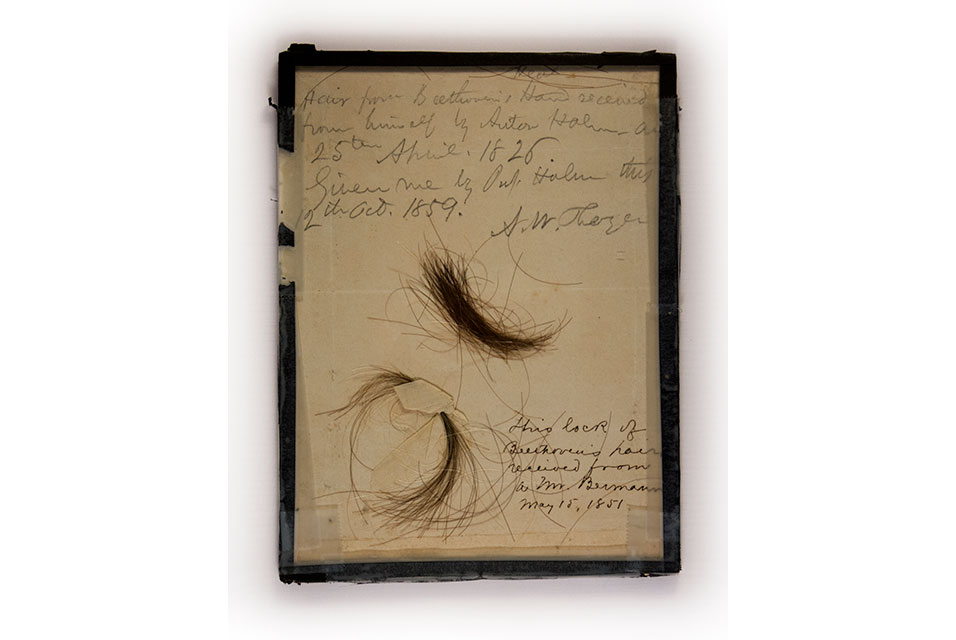Beethoven už umřel a mě taky už není nějak dobře. Peníze nemám, já jsem musel nedávno prodat kamna, abych mohl zaplatit uhlí  ©Felix Holzmann
©Felix Holzmann
Study: Beethoven was full of lead, but it didn't kill him
Categories: Nálezy nejenom s detektorem v západní Evropě
A recent scientific study has produced surprising results about the health of the famous composer Ludwig van Beethoven. Analysis of strands of his hair revealed high concentrations of lead, arsenic and mercury. They contained levels of lead up to 100 times higher than is now considered safe. They caused long-term health complications, but they didn't kill the genius composer.
Scientists at the Ira F. Brilliant Center for Beethoven Studies at San Jose State University sampled five strands of hair that DNA analysis proved to be Beethoven's. They then tested them for poisonous substances. One of Beethoven's strands had 258 micrograms of lead per gram of hair and the other had 380 micrograms, said Paul Jannetto, the lab's director.
The normal level in hair is less than 4 micrograms of lead per gram. "It certainly shows that Beethoven was exposed to high concentrations of lead. These are the highest levels in hair I have ever seen," Jannetto explained, adding that Beethoven's hair contained 13 times the normal level of arsenic and 4 times the normal level of mercury. "But the high levels of lead in particular could have caused many of his ailments," he added.
From the analysis, the researchers calculated that the concentration of lead in Beethoven's blood could have been 69 to 71 µg/dl. This is several times higher than the normal blood lead level in adults, but still not high enough to be considered the sole cause of his death.
"Although the concentrations found do not support the idea that lead exposure caused Beethoven's death, it may have contributed to the documented ailments that plagued him for most of his life," said Nader Rifai of Harvard Medical School. "We believe this is an important piece of a complex puzzle and will allow historians, physicians and scientists to better understand the medical history of the great composer."
The composer suffered from hearing loss in his 20s. High levels of lead adversely affected his nervous system, which may have eventually caused his absolute deafness. It also damaged his liver and kidneys, which may have played a role in some of his other problems, such as depression, mood swings, memory lapses and chronic clumsiness. He also suffered from chronic gastrointestinal problems (painful abdominal cramps, gas, diarrhea).
Scientists suspect that the main source of heavy metals was the wine Beethoven consumed. In the 19th century, it was common to add lead acetate, known as 'lead sugar', to wine to increase its sweetness. In addition, the wine was fermented in vats soldered with lead, which leached out as the wine aged. The corks on the bottles were soaked in lead salt before being put on the bottle to improve the seal. Beethoven drank large quantities of wine because he believed it was good for his health. But also because he gradually became addicted to it. In the last days before his death, his friends gave him wine by the spoonful.
Beethoven lived at a time when knowledge of the toxicity of heavy metals was very limited. Doctors at the time did not know the risks of long-term exposure to these substances. The results of the study provide new insights into the life and suffering of one of the greatest composers of all time. The discovery of heavy metals in Beethoven's hair provides new insights into his lifelong health problems and possible causes of disease. It helps to better understand how the great composer's life may have been affected by factors we now take for granted.
Roman Nemec
Sources: sjsu.edu/beethoven, artdaily.com, livescience.com, academic.oup.com

Beethoven's strands of hair

Beethoven

Beethoven - drawing by Czech painter Antonín Machek
The article is included in categories:



